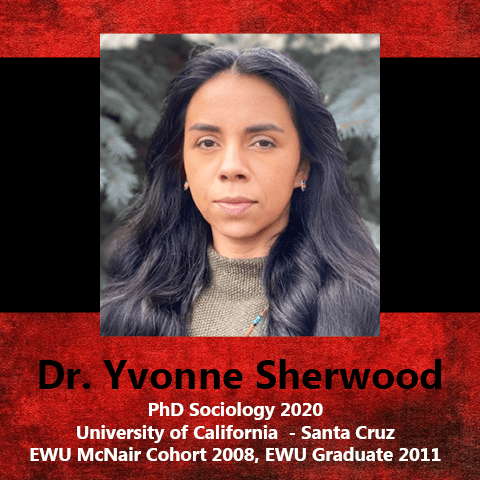
We are honored to have EWU McNair Alumna Dr. Yvonne Sherwood, PhD, Assistant Professor at the University of Toronto, Mississauga, joining us for our “Social Justice in Research” Plenary Session on June 2, at 9 am (register for free here). Dr. Sherwood will join 3 other EWU McNair alumni in this panel preceding the EWU Online Symposium, a collaboration between McNair and CSTEM. In addition to her role as an Assistant Professor, Dr. Sherwood is an incoming committee member of the Canadian Sociological Association Decolonization Subcommittee and a member of UTM’s Vice President & Principal’s Indigenous Initiative working group. She earned her PhD in Sociology with a designated emphasis in feminist studies at the University of California, Santa Cruz. Dr. Sherwood graduated from EWU in 2011 with a double major in Sociology and Women and Gender Studies, with minors in American Indian Studies and Chicanx Studies, which she notes as important studies that continue to inform her research. Below is an interview with Dr. Sherwood about what she’s doing now and some of her thoughts on social justice and research.
Our Interview with Dr. Yvonne Sherwood:
My days are filled with writing and research. In sociology, I teach Indigenous Peoples: Legal Orders and Law and Indigenous Rights, Resistance, and Resurgence. My research focuses on Indigenous Feminisms, Settler Colonialism, Sovereignty, and Anti-Colonial Movements.”
Starts with the fundamental recognition that all knowledge production is political, and therefore no science is “objective” and “pure.” From there, “justice” is grounded in and through our relations and responsibilities to our relatives – both human and more-than-human.”
Though my work continues to change and develop with my understanding of the evolving socio-political context and research, I think a great deal of my work remains tethered to questions that I began asking before I was ever an official student in a university. These are questions like, Why is the environment (land, air, and water) so degraded in our communities? Why do we experience so much violence in our homes and neighborhoods? Why are “we” (Indigenous Peoples) statistically more likely to experience “x, y, and z” in our lives? What can I do about it? As a feminist and sociologist, I’ve learned these questions are fundamentally about power. My undergraduate research helped me to learn that power shapes the questions we ask, the resources put forward to address particular questions, and who gets to then answer those questions. I have continued to keep this in mind in both my own scholarship and mentoring.”
Read: Critical Mentoring: A Practical Guide by Torie Weiston-Serdan. Find strength in knowing you (and your community) are not the deficit despite that much of the dominant narrative places us (marginalized and racialized communities) as needing to be “saved” by schooling and mentorship. You are our strength. Trust yourself and trust your network.”
Read: Critical Mentoring: A Practical Guide by Torie Weiston-Serdan. This is a practical guide on how to best support young scholars and join the next generation of scientists rallying for change.”

